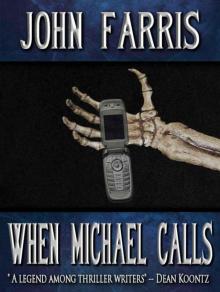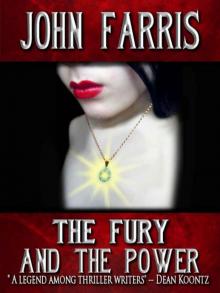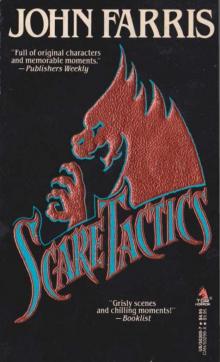- Home
- Farris, John
Fury
Fury Read online
THE FURY
By John Farris
Digital Edition published by Crossroad Press
© 2012 / John Farris
Copy-edited by: Patricia Lee Macomber
Cover Design By: David Dodd
Partial cover image courtesy of:
http://texture-mania.deviantart.com
& others used under the terms of the GFDL
LICENSE NOTES
This eBook is licensed for your personal enjoyment only. This eBook may not be re-sold or given away to other people. If you would like to share this book with another person, please purchase an additional copy for each person you share it with. If you're reading this book and did not purchase it, or it was not purchased for your use only, then you should return to the vendor of your choice and purchase your own copy. Thank you for respecting the hard work of this author.
OTHER CROSSROAD PRESS PRODUCTS BY JOHN FARRIS
Novels:
UNEARTHLY – (Previously published as The Uninvited)
Coming Soon:
All Heads Turn When the Hunt Goes By
Catacombs
Fiends
Phantom Nights
Dragonfly
Also to be available as unabridged Audiobooks!
Buy Direct From Crossroad Press & Save
Try any title from CROSSROAD PRESS – use the Coupon Code FIRSTBOOK for a one-time 20% savings! We have a wide variety of eBook and Audiobook titles available.
Find us at: http://store.crossroadpress.com
AUTHOR'S NOTE
The Fury is a work of fiction. I felt free to take certain liberties with actual locations in and around New York City—you won't find Sutton Mews or the Washington Heights Hospital on any map of the city. Paragon Institute is imaginary. Although my characters are as real as I can make them, fortunately none of them exists outside the pages of this book.
For Kathy
1
If the doors of
perception were
cleansed, everything
would appear to
man as it is, infinite.
—William Blake,
The Marriage of Heaven and Hell
2
On his good days
he was eerie. He
could make the rest
of the human race
feel obsolete.
—Mrs. Roberta P. Edge
3
Self-interest is the
only constant in
life, and murder
is always
preferred to impotence.
—Childermass
4
What they did would do them in.
—Anne Sexton,
The Book of Folly
Chapter One
Lately many of the girls Gillian went to school with seemed to be going through some sort of morbid crisis or startling personality change. Most had already turned fifteen, with Gillian the laggard in her class; she wouldn't be fifteen until the fourth of February, halfway through the school year. Anne Wardrop, the poor klutz, had suffered a bona fide nervous breakdown precipitated by a really terrifying laughing jag during the Verdi Requiem at St. Bartholomew's. Gillian shuddered when she heard the details, but Anne had been through three stepfathers and a change of analyst every few months for the past two years, and everybody knew she was bound to come unwrapped. On the other hand, Carol Dommerick, she of the bright blue stare and whispering shyness, had discovered sex and was carrying on a precocious affair with a twenty-three-year-old seminarian at General Theological. After four and a half months of acute anxiety Bo Crutcher's parents had traced their daughter to Mexico and retrieved her from a hovel by the sea, strung-out, yellow as a pumpkin and full of pinworms: Bo wouldn't be returning to Bordendale this year. Sue Noyes, who had always cared a great deal about how she looked, now had to be sternly reminded to bathe and use a toothbrush, and she was letting the strong dark hair run wild over her body. Then there was Wendy Van Alexia—horse bum and free spirit—who had taken a running dive into the existentialist philosophers and the more cheerless nineteenth-century Scandinavian playwrights. Wendy didn't smile often any more, and Gillian missed that smile.
Bright girls, rich girls, privileged children of New York, a city that has too much of everything and is hard on tender psyches—was it the pressures of the city itself or the insupportable neuroses of their parents that was getting so many good girls down? Gillian, who had always lived on an indescribably expensive plot of ground known as Sutton Mews, loved city life, and she also knew some pretty disturbed kids who lived in Plandome and Pound Ridge. But it seemed obvious that in the city the process of natural selection was harsher, accelerated.
Gillian's father, an amateur anthropologist, had expounded on the lack of ritual, the coming-of-age rites that scarcely exist in an industrial society (except as spontaneous and frequently destructive variations on archetypal forms). In tribal cultures, regardless of the complexity of the environment, it is ritual that provides an orderly and firm sense of transition from childhood through pubescence. There is wonder in it, he said, and dignity, and a sense of fulfillment. One has lived up to the expectations of the group. One is accepted. It was quite a lot for Avery Bellaver to say, even when you got him started on a Favorite Topic.
"But in the so-called advanced civilizations, where taboo is breaking down and family groups are fragmented, acceptance and approval are concentrated in highly structured peer groups where the rules are constantly changing, dictated by fashion, by the, ah, soul-destroying perversities of our merchandisers. Except in the case of the orthodox religious among us, there are no guidelines for the young. Communication is faulty, expectations blurred. Eccentric standards of maturity are imposed on ten-year-olds by irresponsible media and disenfranchised adults. The demands change so capriciously it doesn't astonish me to see very young school children standing on street corners with bulging satchels and utter blankness in their eyes, as if they are about to scream. What do they want? What do I do now? There are those few, I suspect, for whom it doesn't matter, children who have the inherited stamina and self-focusing qualities necessary to survive. For the many the failure to be informed of their status is excruciating. Eventually emotional seams give way and our shamans appear unequal to the task of integrating the frail and the fallen into what is, essentially, a societal madhouse."
He blinked and was pleased with himself, but then he looked warily at his daughter.
"You're not cracking up, are you?"
Gillian was so surprised she had to laugh, which hurt his feelings.
To make up for it she kissed him lightly and quickly, with a blush of sympathy and love for this aging, lonely man who could be so astute about the human condition and so totally unable to cope with the few demands that life made on him.
"I'm fine, but some of my friends aren't."
"Oh, yes. So many new faces around here. That delicate and lovely child who trembles sometimes, all over, for no apparent reason. You handle them all well. You're good to them. You listen."
Larue was the girl who trembled. She had arrived from California in October, stunned as a refugee, and Gillian immediately took her into protective custody. Larue was dismayed by the snarling city, allergic to every breath of air she took. She was accustomed to a three-hundred-acre ranch near Santa Barbara and blissful Malibu summers.
Her father was a film director, down on his luck and trying to revive his career with a Broadway musical. As a director he had the instincts of Torquemada, and he wasn't all that much fun around the house, either. Larue's mother was an actress who worked regularly in Italian co-productions on far-flung locations, a situation Gillian certainly knew by heart. The move would have been trauma enough for Larue, but the half-brother to whom she was devoted had been kille
d hang-gliding in the Rocky Mountains that summer. Larue had witnessed his speedy, clipped-wing collision with solid rock; thus the occasional spell of the shakes and the long-lost glaze in her eyes when she thought of him. Gillian wanted to take Larue to Acapulco with the family over Christmas, but for some dim reason Larue's father hadn't approved.
That Monday before Christmas Larue came over to spend the night. The stores were open late and both girls had shopping to do. It was cook's night off at the Bellavers’, so they ate at a Beefsteak Charlie's on Fifty-seventh, did Bloomie's and caught the eight-thirty show at the Trans-Lux. Snow mixed with rain was falling when the movie let out, but it was only a four-block walk to Sutton Mews, which faced the river just south of the Queensboro Bridge. A freighter plowed beneath the bridge in a blaze of running lights, making waves that smelled of the sea. Larue was instantly homesick for the foggy Pacific.
"If you have to live in New York," she said wistfully, "this is the place."
There were three joined, early nineteenth-century Adam houses on the short stretch of cobbled mews, which had been a Bellaver family enclave since the 1850s. The mews was reached through an arched gateway off Sutton Square, and it was protected by a six-man private police force. Gillian lived in the sunny brick corner house. Twelve ample rooms, a staff of seven, most of them day workers. Next door was Grandmother Min's house, but for most of the year only the houseman was in residence. The third and largest house belonged to Gillian's cousin Wade, who like most of the Bellaver men was in the banking and investment business. They toiled in discreet offices and peopled boardrooms across the land, tending the family's money like so many lettuce ranchers. The family was Anglicized French, its fortune solidly based: land grants in millions of acres dating from the time of James II, the value of the land enhanced a hundredfold by fossil fuels.
Two years ago, when Gillian's father had turned up alive and well on one of the Lesser Sunda Islands after being missing for three weeks, Time magazine reported that Avery Bellaver's personal worth was in the neighborhood of two hundred and seventy million dollars. It was news to Gillian, and not very interesting news; but she was ecstatic to see in print that "the least-known member of a mighty clan has made lasting contributions to the science of anthropology." Now there was something to be proud of.
It turned out to be one of those really great evenings that just fall into place without any planning. After the girls changed into around-the-house clothes—sweaters and old Levi's with wraps and patches of vinyl tape—Gillian coaxed her father from the depths of his ground-floor library. Avery was self-taught and proficient on piano and bass. Larue played both classical and jazz guitar. Gillian was eclectic: harp, flute and stride piano, which she had picked up from one of the musicians who was a fixture at her mother's parties. They worked on Fats and Willie the Lion and some contemporary swinging lines until after midnight, then cooled out with an hour of recorded Shearing. The girls went to bed too exhausted to gossip, and were asleep in two minutes.
And, in the morning when Gillian woke up, her mother was home, which qualified as an event.
Gillian guessed that she had slept hard, which was a recent problem. Dreamless, muscle-clenching sleep that often left her groggy for minutes after opening her eyes, feeling as played-out as if she'd spent the night climbing mountains. A tepid needle shower usually restored her to the level of brisk efficiency, which mimed her mother's natural vitality. But this morning she had a dull headache and swollen glands in her neck, and she felt too wan to strip and go through the usual bracing routine. Anyway, there was no school and no pressing business before noon, and Larue was still sound asleep in the other bed, a pillow placed to block the sun. Gillian got up and put on her Indian mocs, drew the drapes together and went to the bathroom.
Sitting on the john she felt a little dizzy, and the headache wasn't going away. She seldom needed medicine of any kind, so there was nothing in reserve in her own bathroom. But a couple of painkillers seemed like a good idea. She walked upstairs to her parents' floor and chewed up four of the orange-flavored baby aspirin which Katharine Bellaver stored behind twenty kinds of natural vitamins.
Avery had departed early for the Museum of Pan American Culture which he had founded, and which was preparing the definitive exhibit on Toltec mythology. But Gillian heard Katharine thumping around her atelier and went up the winding iron stair to say hello.
Her mother had come in around 3 A.M. from Washington; it was now a little after seven and here she was in a leotard serenely doing the Plow. Katharine was forty-five, as long-legged as Gillian but not as tall. She was bronze-tan, with auburn hair worn in a full springy cascade of choice curls; on the girlish side but she could still get away with it. Her teeth were so good they looked unused, as if she'd been raised intravenously.
Gillian coughed glumly and looked around the studio where Katharine worked at her photography. It was one of her favorite rooms in a house she loved: vastly overblown celebrity faces looking back at her from eggshell walls, the pungent darkroom airs, the way the incoming sun joined floor and walls in brilliant geometry. Sitting here, warmed on a winter's morning, was like sitting in the shallows of an equatorial sea.
Katharine was a pretty good photo-journalist; originally she got work and magazine space because she was fabulously well-connected, but that was years ago and she had two volumes of photo essays behind her to prove she wasn't a dilettante. She had an excellent working knowledge of modern art, owned a gallery on Madison and a gallery in the Hamptons that made money, was a partner in a documentary film company and had published two short stories which Truman Capote, the grande dame of American letters, had described as "magical." Katherine segued from the Plow into something else that looked excruciating, and smiled at Gillian.
"You didn't get accreditation for the Teheran Conference," Gillian said without thinking, and was sorry. It wasn't the time for prescience. Katherine's smile turned a little sour.
"You are uncanny this morning."
"I remember you told me it was going to be a tough nut to crack."
"Oh, well, it isn't that much of a problem. The Shah will be in Switzerland this weekend. So Duff will mention me to Binnie and Binnie will mention me to His Imperial Majesty and I'll be in, and screw the goddamn protocol." She moved slightly and something popped, causing her to wince in surprise. "Do you feel Christmasy yet? I don't feel very Christmasy this year."
Gillian's nose was leaking, so she nuzzled it unobtrusively against the sleeve of her robe, which had to go into the laundry anyway. "Aren't you well?" Katharine asked.
"I feel okay."
"Your eye is really turning in this morning."
"Thanks for telling me." It was the one thing Gillian hated about herself, the slightly inward left eye that other people found charming and no distraction in a beautiful face. She'd been turning down modeling jobs since she was twelve. Well, so Katharine had scored, and they were even for now. Why it always had to be like this she didn't know. They certainly liked each other. Probably they loved each other. But they cohabitated badly, really nothing to be done about it. Gillian had too quick a tongue and her mother's obsessive sense of competition was wearing. Maybe it was something as simple as Katharine's fear that Gillian knew more about her love life than Gillian could possibly know.
"Want to join me? Rhythmic breathing is the key to—"
Gillian pressed her nose against her sleeve again.
"I'm not dressed."
"Who's watching?"
Who indeed, but Gillian was just coming into her shape and her style and she had a natural sensitivity about her body, about the last bit of baby fat and the burgeoning breasts with nipples that overwhelmed them like the noses on the faces of baby seals. She excused herself and went back to her own room.
Larue was waking up with little groans of pleasure. Gillian made room for herself on her bed beside Mr. Rudolph and Sulky Sue the house cats and explored the glands under her jaw with her fingertips. Pressure hurt. She wondere
d if she was about to come down with something.
"You talk in your sleep," Larue said.
"I do?"
"Loud enough to wake me up. It must have been three or four o'clock. It was still dark out, but it wasn't raining. I could see you in the light from the street. You were sitting up in bed with your eyes wide open. I thought you were talking to me, but when I said something you acted like you didn't hear. You went right on talking to somebody else. A boy, I think."
"What'd I say?"
"I couldn't catch a lot of it. You asked him if he was happy. You wanted to know—if they were treating him all right. Then you didn't say anything for a long time. You didn't move. You just—stared. You started to cry."
"God, how weird! Then what?"
"You tried to get out of bed, but you were as uncoordinated as a baby. You said, 'No, no, don't let them do that!' Then I guess the dream was over. You just collapsed and rolled over and pulled the covers up around your head. I had to go to the bathroom, and when I came back you were totally zonked. Do you know what you were dreaming about?"
"I never remember my dreams."
"I don't either, just the bad ones." Larue yawned. "What are we going to do today?"
"Well, I have flute at one, and after that—we could go ice skating?"
"Okay," Larue said.
Chapter Two
The Trailways bus from Newark left Peter Sandza in Atlantic City at a quarter past six in the morning. He had an hour's wait for the feeder-line bus that would take him on down to Royal Beach. The snack bar in the bus terminal wasn't open yet, so he walked three blocks, bucking the gritty salt wind off the Atlantic, and had coffee and buttered toast in the coffee shop of a hotel that looked, as most of the city looked by winter light, long-dead and archaeological.

 Sacrifice
Sacrifice Wildwood
Wildwood Fury
Fury Captors
Captors When Michael Calls
When Michael Calls Fury and the Power
Fury and the Power Dragonfly
Dragonfly Scare Tactics
Scare Tactics